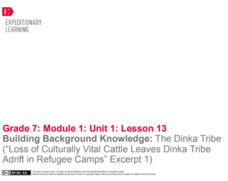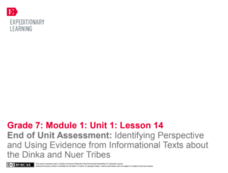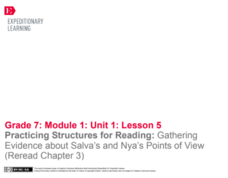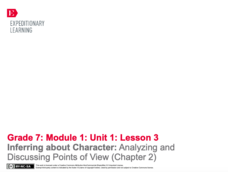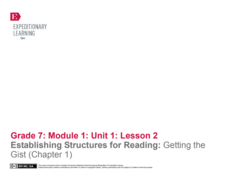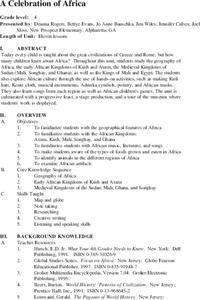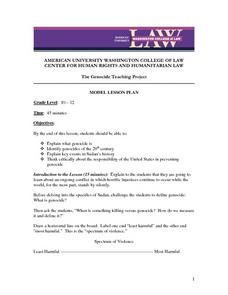EngageNY
Building Background Knowledge: The Dinka Tribe (“Loss of Culturally Vital Cattle Leaves Dinka Tribe Adrift in Refugee Camps” Excerpt 1)
Text annotations help readers track essential ideas. Pupils continue reading and annotating an informational article about Sudanese tribes, connecting it with A Long Walk to Water by Linda Sue Park. They also begin writing about their...
EngageNY
End of Unit Assessment: Identifying Perspective and Using Evidence from Informational Texts about the Dinka and Nuer Tribes
Pupils consider the varying perspectives of people in different cultural groups as they read an informational text about the Dinka tribe of Southern Sudan and complete graphic organizers. They also respond to a constructed-response...
EngageNY
Building Background Knowledge: The Dinka and Nuer Tribes Until the Mid-1980s (“Sudanese Tribes Confront Modern War” Excerpt 2)
Scholars continue making connections between the article "Sudanese Tribes Confront Modern War" and A Long Walk to Water by Linda Sue Park. They talk with partners to discuss how the article helps them understand a character's point of...
EngageNY
Building Background Knowledge: The Dinka and Nuer Tribes
Building on a previous lesson plan, readers continue using context clues to learn new vocabulary. Additionally, they continue working on their Gathering Evidence graphic organizers, making connections between an informational text and A...
EngageNY
Building Background Knowledge: The Dinka and Nuer Tribes Until the Mid-1980s (“Sudanese Tribes Confront Modern War” Excerpt 1) (Version 1)
Readers consider comparisons between the Dinka and Nuer tribes in South Sudan, making connections between an informational article about Sudanese tribes and the novel A Long Walk to Water by Linda Sue Park. They annotate the text to help...
EngageNY
Mid-Unit Assessment: Gathering and Using Evidence to Analyze Points of View in A Long Walk to Water (Chapter 5)
Class members discuss how culture, place, and time influence a character's identity in A Long Walk to Water by Linda Sue Park. Then, as part of a mid-unit assessment, they complete a Gathering Evidence graphic organizer to answer the...
EngageNY
Practicing Structures for Reading: Gathering and Using Evidence to Analyze Salva’s and Nya’s Points of View (Chapter 4)
Class members discuss the gist of chapter four of A Long Walk to Water by Linda Sue Park with a partner and share their responses with the class. Next, they complete graphic organizers to answer text-dependent questions based on a close...
EngageNY
Building Background Knowledge: The Lost Boys of Sudan
Get deep! Teach scholars how to make connections between texts to deepen their understanding of a topic. Using the resource, pupils read and annotate a short informational text about Sudan's Civil War and refugee crisis. Next, they...
EngageNY
Practicing Structures for Reading: Gathering Evidence about Salva’s and Nya’s Points of View (Reread Chapter 3)
How does an author develop and contrast character points of view in a work of literature? Using a graphic organizer, readers continue gathering evidence about character point of view from Linda Sue Park's A Long Walk to Water. Next,...
EngageNY
Establishing Structures for Reading: Gathering Evidence about Salva’s and Nya’s Points of View (Reread Chapters 1 and 2)
Readers practice gathering textual evidence to support their understanding of character point of view in A Long Walk to Water by Linda Sue Park. Working with partners, they complete a Gathering Evidence graphic organizer and engage in...
EngageNY
Inferring about Character: Analyzing and Discussing Points of View (Chapter 2)
Readers engage in discussion with partners to answer questions about A Long Walk to Water by Linda Sue Park. Next, they complete exit tickets, writing about how the author creates different points of view for her characters.
EngageNY
Establishing Structures for Reading: Getting the Gist (Chapter 1)
Class members review expectations for successful discussions before reading chapter one of A Long Walk to Water by Linda Sue Park. They engage in a think-pair-share to discuss the gist of the text and add their thoughts to their Readers'...
EngageNY
Reading the Map and Beginning Chapter 1
Seventh graders begin their study of Linda Sue Park's A Long Walk to Water by discussing scenarios related to the novel with a partner. The discussion topics invite pupils to consider how various factors, such as war and poverty,...
United Nations
The UN: Working for Us All
The United Nation's role in world diplomacy is critical, but its enforcement is limited. Using activities such as role plays and simulations, classmates consider the role the UN plays in world peace keeping. The unit plan includes five...
Curated OER
A Celebration of Africa
Students investigate early African civilizations. They create Kufi hats, musical instruments, pottery and African masks, sing songs, play African studenT games, and participate in a feast and tour of a museum where their artwork is...
Curated OER
Darfur: Violence and the Media
Learners read an article on Darfur prior to class, discuss the conflict in Darfur, visit a series of websites, and complete a worksheet evaluating the reporting and sources used. They view films on genocide to decide if the Darfur...
Curated OER
Crisis in Darfur
High school social studies teachers addressing the crisis in Darfur could use elements of this plan to increase social studies vocabulary and research skills. It includes a page of lecture/discussion notes, instructions for creating...
Curated OER
Cartoons for the Classroom: A Call to Action
In this current events learning exercise, students analyze a political cartoon about about the state of Sudan. Students then respond to 3 short answer questions.
Curated OER
Cartoons for the Classroom: Drawing Attention
For this current events worksheet, students analyze political cartoons about the scores of people dying in Sudan. Students respond to 5 talking point questions.
Curated OER
The Genocide Teaching Project
Students investigate what genocide is as well as places that it is found in the 20th century. They trace the history of genocide back to the events that occurred in Sudan's history. Brainstorming ways to prevent the ongoing conflicts and...
Curated OER
Crisis in Sudan: Responding to Medical Emergencies
High schoolers examine the crisis in Sudan. They identify the medical situation in the region and discover how they respond to emergencies. They research diseases that are prevalent in the region as well.
Curated OER
Sudan -- Efforts to Avert Genocide in the Making
Students examine current events in Sudan and their efforts to prevent another genocide. They identify the roles of different humanitarian organizations in the area. They research the efforts to bring those accused of genocide to justice.
Curated OER
Build a U.S. Strategy for Responding to the Crisis in Sudan
Students work together in groups to discover the situation in Sudan. They discuss what problems arise from helping a foreign country. They answer questions and watch a video as well.
Curated OER
The East Africa Times
Students work in teams as editors to design the front page of a newspaper covering a country in east Africa. They individually research and write articles that define modern life for the country's citizens.


